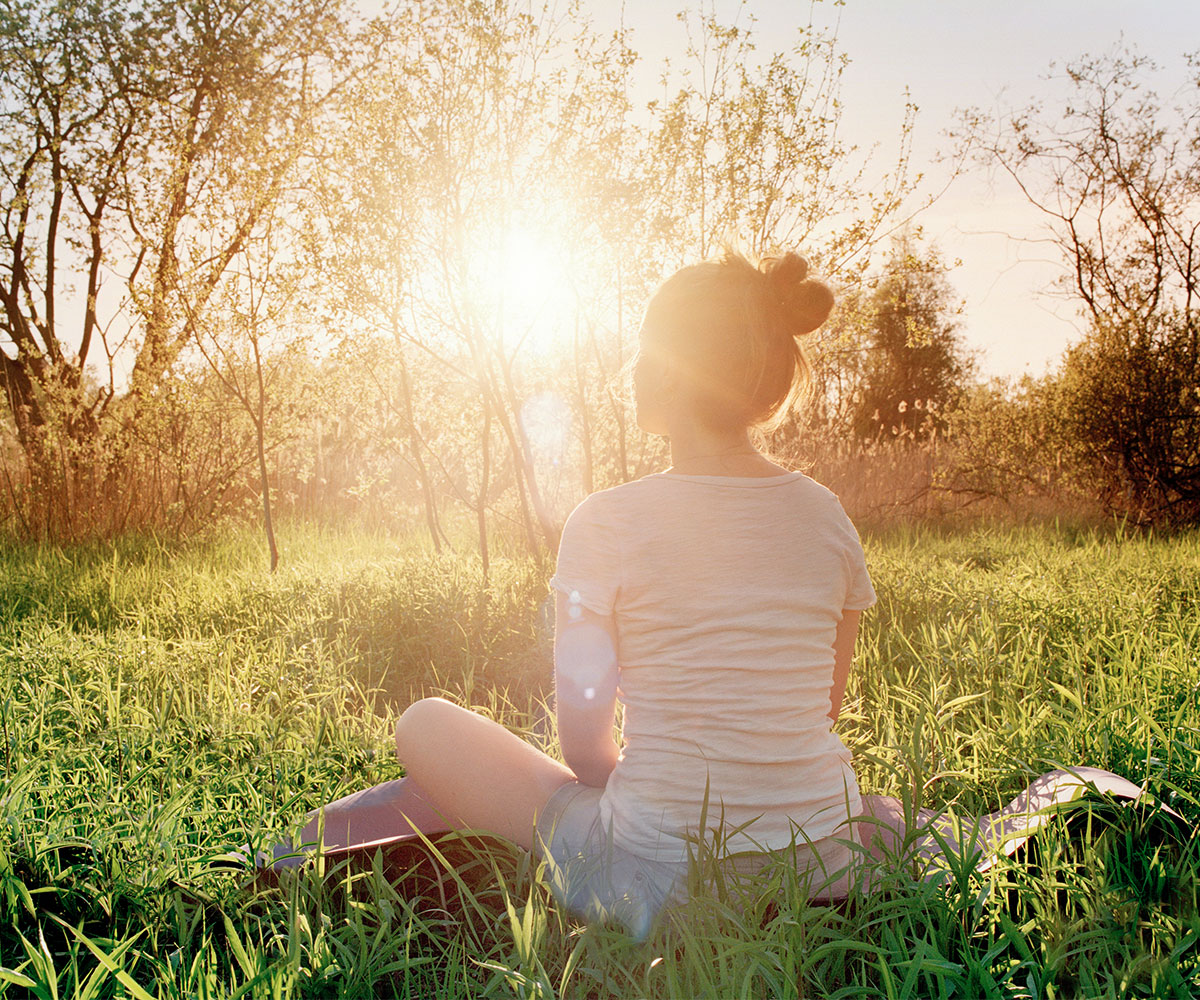It happened in the tuna aisle at the supermarket.
Journalist Jill Stark, 42, was feeling miserable, unmotivated and beset by a nameless sense of “what’s the point?”.
As someone who’d long battled an anxiety disorder, she knew it was important to set small goals for herself every day.
“Even on the very worst day, the least I could do for myself was put food in my body,” she says.
So on this particularly black afternoon, she peeled herself off the couch, dragged herself to the supermarket and contemplated her dinner options. She wanted something simple, something comforting. A pasta bake, she thought – hot, carb-rich and nourishing.
“I found the tuna aisle, and that’s where things fell apart,” Jill writes in her new book Happy Never After. The lights were harsh. The options seemingly endless. She was confronted by dozens of varieties of tuna.
Tuna in oil. Tuna in brine. In spring water. With lemon. With jalapeno. Sweet Thai chilli flavour. Mild Indian. Anxiety gripped her. She just wanted a normal can of tuna.
“I dropped my empty basket on the floor and ran from the store, silently weeping over an abundance of canned fish,” she recalls.
A can of tuna wouldn’t normally reduce Jill to a quivering mess. She was a top journalist whose first book had become a best-seller. But she was going through an unprecedented period of confusion and misery.
For her whole working life, she had been striving towards the goal of becoming a respected writer, and when her success didn’t bring the happiness she craved, she plummeted into a panicked downward spiral.
She felt broken, distraught and confused. She had everything she was told she should want, so why was she so supremely miserable? It’s a question she’s not alone in asking.

Happiness is big business. From yoga retreats to the recent hype around gratitude journals and everything in between, it seems there is little we won’t try in the pursuit of joy.
In the United States, self-improvement books, seminars and services net about US$10 billion a year – earnings roughly the same as Hollywood’s, according to Time magazine.
Everyone is looking for a way to offset the stress of modern life, yet the problem seems to be growing. Alongside that growth is an increase in the use of antidepressants.
In New Zealand, research from The University of Auckland estimates that one in nine adults are prescribed antidepressants each year.
We’re not alone. A survey by Australian women’s health organisation Jean Hailes found almost half of Australian women (46.1 per cent) have been diagnosed with depression or anxiety, and in OECD countries the consumption rate of antidepressants doubled between 2000 and 2015.
Companies like Google employ “chief happiness officers” and in 2014 the World Economic Forum, which usually focuses its attention on terror threats and post-GFC economic recovery, dedicated 25 sessions to creating mental and physical “wellness”.
However, as Jill found, the fixation on happiness can leave us feeling profoundly unhappy.
In societies like ours, where we’re taught we’re masters of our own destiny, this only serves to make us chase happiness more. And that, says Melbourne University academic Brock Bastian, is precisely the problem.
“Positivity has become the new crack of the upwardly mobile,” Dr Bastian says. “Sold on this idea, we see happiness as a natural state, the expected equilibrium. Yet, the harder we try to reach this plateau of happiness and eradicate all suffering, the more inadequate we may be led to feel.”

Comparing our lives to those seen on social media doesn’t help , giving us an edited highlights reel of others’ lives, which we measure ourselves against.
If comparison is the thief of joy, we are in the midst of a crime wave. Evangelical self-help gurus who tell us we’re responsible for our own happiness make us feel worse by leading us to believe we have somehow failed if we’re not content.
Exacerbating this problem, somewhat paradoxically, is the vast improvement in the standard of living.
“We become numb to simple creature comforts, stripping them of their ability to deliver any pleasure,” Dr Bastian writes in his book The Other Side of Happiness. Our comfortable existences have narrowed the “emotional bandwidth” of life, he says.
According to Jill, “happiness set point” theory sheds more light on this. The theory goes that our outlook adapts after life-changing events but our level of happiness usually returns to our individual happiness set point, which is determined by a combination of genetics and conditioning.
“The concept came from a 1978 study which found lottery winners were not significantly happier than those in a control group, while conversely, people with spinal-cord injuries were much happier than might have been expected,” she says.
In her odyssey back to good mental health, Jill cast off traditional Western goals of career-partner-wealth and searched for other pathways to contentment and meaning.
The starting point, according to Dr Bastian, is to accept it’s neither possible nor desirable to be in a state of perpetual bliss.
He recently conducted a study which examined how our expectations of happiness and success can inhibit our ability to achieve it.
He separated psychology students into three groups, and gave each a series of puzzles to solve. The first two groups were given the same set of puzzles – about half of which were unsolvable. Group A worked on their task in a room decorated with motivational posters and notes and books that emphasised happiness.
The instructor was directed to speak in an upbeat tone and make reference to the importance of happiness.
The second group completed the puzzles in a neutral room with a neutral instructor.
The third group was in a room decorated like group A’s, with motivational posters and a positive instructor, but their set of puzzles were all solvable.
Afterwards, the students talked about their feelings. Group A tended to dwell on their failures, whereas Group B and Group C, who didn’t experience a gap between their expectations and their outcomes, were markedly more upbeat.
Conditioning people to achieve success and happiness changes how people respond to their negative emotions and experiences, causing them to feel worse about their failure, Dr Bastian concluded.
Historically, adversity is important.
“That’s where we grow, in places of discomfort,” he says. “We have this idea that if we could just provide our children and our society with more comfort, maybe we’d be happy, and that isn’t true.”
Of course, being too uncomfortable isn’t good either. He is not suggesting that the homeless or chronically ill are to be envied, simply that there is value to be found in a little hardship.
“You can’t feel challenged by something that is comfortable,” he says.

It’s an idea that is gaining recognition. In the United Kingdom, educators are starting to introduce “controlled risk” into playgrounds to increase resilience and a sense of wonderment and adventure in children.
The Princess Diana Playground in London’s Kensington Gardens is one place that has adopted this philosophy. A sign outside the playground informs users that risk is “intentionally provided” so children can develop “an appreciation of risk in a controlled environment”.
Playtime is not only richer and more enjoyable, but also more beneficial to children developmentally when it contains elements of risk.
Significant research is now being amassed on the benefits of play for adults. Jill explores this in her book.
After attending a No Lights No Lycra dance party, she found herself “riding high on euphoria… I’d been blissfully lost in a state of play,” she said.
American designer and writer Ingrid Fetell Lee explores the importance of play in her book Joyful, and why playfulness is crucial to achieving fleeting moments of daily joy, as well as long-term good mental health.
“Play is one of our greatest means of accessing delight,” Ingrid writes. She cites the work of Stuart Brown, the founder of the United States’ National Institute for Play, who studied convicted murderers in the Texas prison system and found nearly all of them had “deficient or deviant play histories”.
“Play promotes flexible thinking and problem solving, which increases our resilience and helps us adapt to change,” Ingrid writes. “When we play, our awareness of time diminishes and our self-consciousness fades. Play can put us in a powerful flow state, which allows us to let go of everyday worries and be absorbed in the joy of the moment.”

Money can’t buy happiness but the old adage hasn’t stopped people trying.
The mindfulness colouring book craze of 2015 showed just how many people were searching for a quick and convenient way to rid themselves of stress and negativity. So voracious was the demand that Faber-Castell pencil sales increased by 600 per cent. The company had to put on extra shifts at its Bavarian factory.
Many of us lust after beautiful shoes or prestige cars, convinced that we’ll be content once we have them in our possession. Of course, nothing we buy can deliver lasting happiness.
The advertising industry’s promise that our discontent can be cured at the checkout, and the way this message saturates the media, is part of the problem, Jill says.
“The advertising industry’s entire business model is based on this idea that you are not enough: if you just buy this, if you just lose these five kilos, then you might be enough,” she says.
It’s an empty promise.
A Stockholm University study of more than 3000 lottery winners found that, aside from a brief initial spike, the winners were no happier after they won the lottery than before.
This is in part owing to the happiness set point, but is also borne out by significant research into money and happiness.
A study conducted by Princeton University found wealth does not improve happiness.
“Low income exacerbates the emotional pain associated with such misfortunes as divorce, ill health and being alone,” the study found, but money stops enhancing happiness once individuals earn an annual income of US$75,000 (about $115,000). Beyond this, money has no effect on daily mood.
The average New Zealand income is $49,000 per annum.

UK author Marianne Power spent a year ruminating on happiness and concluded that the key was living a moderate life like her mother.
A freelance writer living in London, Marianne had ticked all the boxes on modern society’s happiness checklist: a good job, nice clothes, a comfortable home. Yet something was missing.
She embarked upon a year-long journey of self-help. Each month she followed the rules of a different self-help book.
Throughout the experiment, she was at odds with her mother, a stoic woman brought up on an Irish farm in a family of seven children.
Marianne’s conclusion was that her mother had far more contentment in her life as a result of simply “getting on with things”, and feeling grateful for small pleasures like a cup of tea.
“When I told Mum I wanted to be happier,she told me happiness wasn’t real. I told her she was miserable. The ridiculous thing is Mum is a much happier person than me because she doesn’t chase happiness,”
Marianne wrote. One of the biggest lessons Marianne learnt from her mother was that she didn’t worship at the altar of material goods.
“There’s so much crap that we don’t need and everything is in huge letters and is trying to get our attention,” Jill says.
Following her tuna aisle breakdown, a psychologist told Jill the most common place his patients had panic attacks was in the supermarket.
“Supermarkets are similar to other parts of our lives,” Jill says. “We’re looking for something to fill the gap, and we have all this choice but we’re anxious that the thing we choose might not be the perfect thing… It’s a sensory overload. It feels like you’re being bombarded with choices and the research shows that the more you’re bombarded with choices, the more difficult it is to actually choose something.”

The happiness gap is a modern problem. The frantic, 24-hours news cycle, constant messaging from advertisers and social media that we’re inadequate, and the increasing prevalence of smartphones are all working against us.
Neural complexity specialist Fiona Kerr says smartphones ultimately make us more isolated and unhappy.
“You just look at everyone and they’re looking at their screens,” she says. “If I was to beam down I would think that’s our power source.”
The problem with phones, Dr Kerr says, is that we’re more interactive than ever before, but not more connected. When we reach out to our family or friends via our devices, we have a different neurological response than if we sit down with them and share a coffee or a nice meal.
“Part of your brain lights up when you look at someone directly – when you have eye contact,” Dr Kerr says. “We have physical synchronisation of specific parts of our social networks in our brain. We have endorphins that interact. We have this whole cascade of chemicals that only occur when we are physically together in the same proximity and those things cannot happen over a screen.”
Substituting text messages or FaceTime chats for a meaningful in-person catch-up reduces the benefit of the interaction, but tricks us into thinking we have serviced this deep, mammalian need. Losing a sense of being part of a group is very damaging to humans.
“To feel connectedness is critical to human wellbeing,” Dr Kerr says.
One of the most striking experiments Jill examined during her road to recovery underscores the importance of community.
The 1970s Canadian experiment, Rat Park, took the conventional wisdom that chemical hooks are the reason for addiction, and turned it on its head.
For much of the 20th century, our understanding of addiction came from a study in which caged rats were given two water bottles – one containing clean, fresh water, and the other containing water laced with heroin or cocaine. The rats would go back to the drugged water again and again until they overdosed and died.
In Rat Park, the rats were placed in cages with the same two water bottles – one drugged, one clean – but instead of being in tiny, bare cages, they were kept in cages with coloured balls, wheels, food and, crucially, playmates. In this scenario, none of the rats became addicted to the drugged water.
“The overwhelming reason for addiction is the pain and isolation the individual feels,” drug reform advocate Johann Hari told Jill. “The opposite of addiction is not sobriety, it’s human connection.”
Like most people, Jill’s journey out of unhappiness is more complicated than dancing in the dark and enjoying life’s simple pleasures.
She will continue to campaign for better mental health funding and isn’t suggesting that people with crippling anxiety or depression should simply try harder. But she is grateful for her breakdown because she is now “living her life in a better way”.
That better way involves small changes like making time for play, taking breaks from social media, critically assessing advertising messages and not expecting any person or achievement to “complete” her.
Dr Bastian would add to this the importance of accepting pain and discomfort as natural parts of the human experience that ultimately enrich our lives.
He shares a story of a Chilean hike that elegantly illustrates this point.
It was a seven-day hike up forbidding mountains, during which he weathered snow storms and recurring altitude sickness. On the fifth day, he came across a little hut that sold beer, not far from a camping site by a hot spring.
“I’ll never forget the absolute pleasure of sitting in those hot springs, resting our weary feet and drinking that beer,” Dr Bastian recalls.
In fact, the beer was warm and the hot spring stank of sulphur.
“What made this so pleasurable was not the quality of the hot spring or the beer, it was the five days of hiking, the cold, the snow and the sickness that came before it,” he says.


